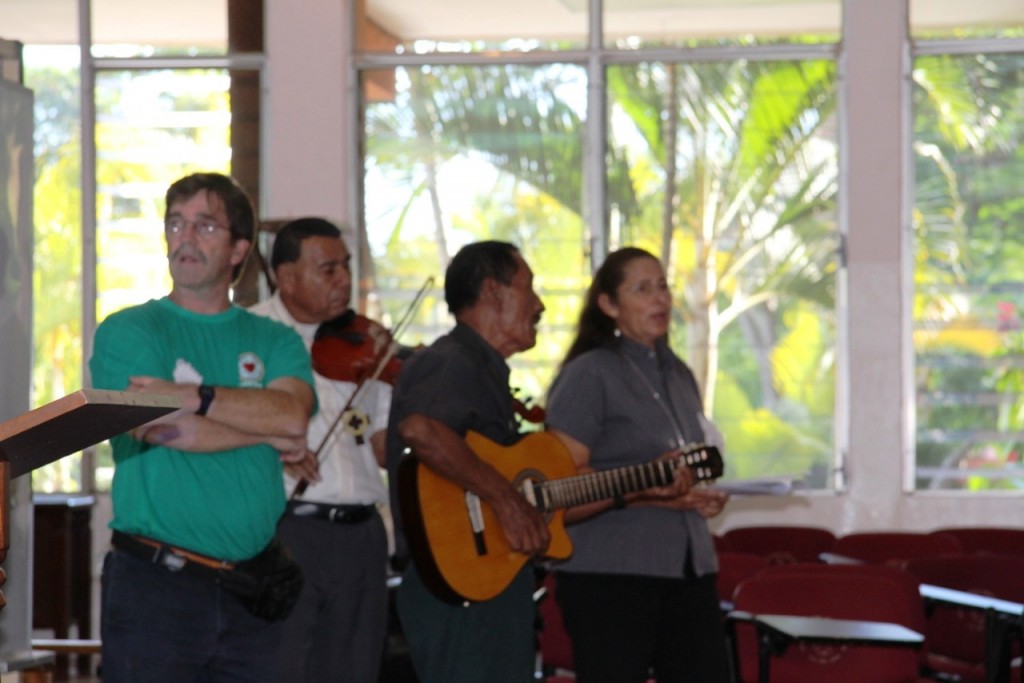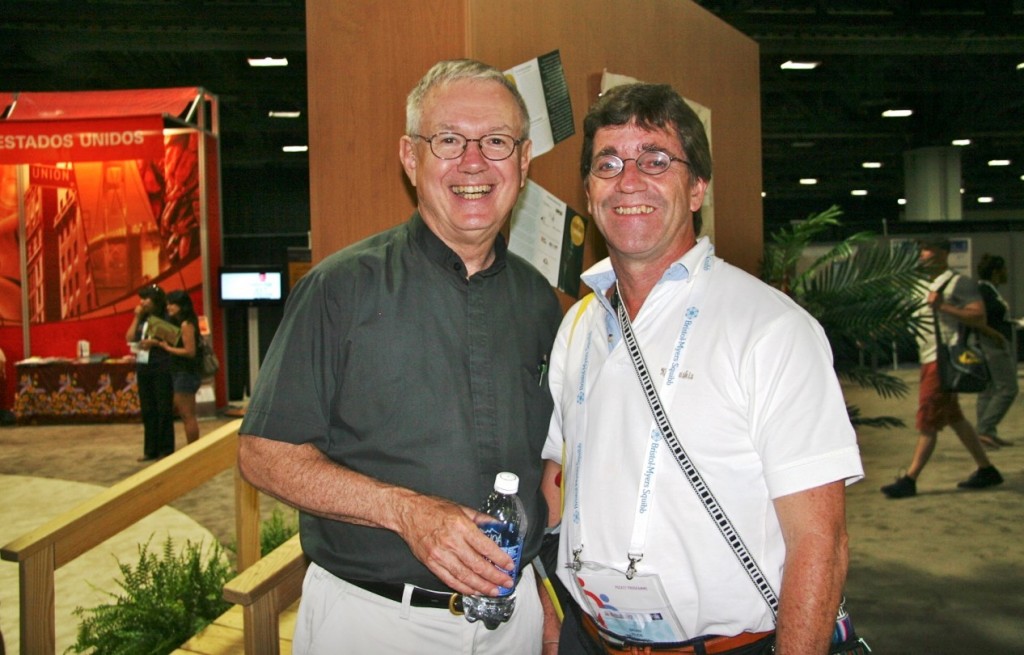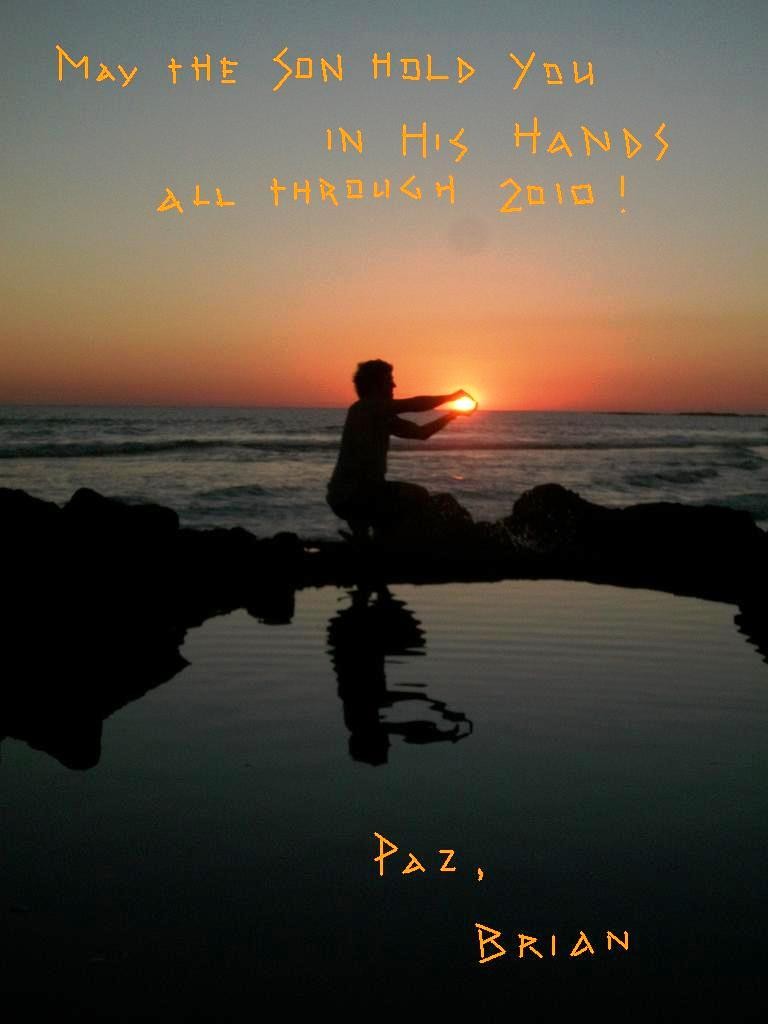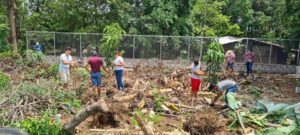“My Passion is to Accompany the Outcast, the Marginalized, Those Squeezed to the Edges.”
STORY OF BRIAN RUDE
Editor’s Note: Imagine trading your Gore-Tex winter parka and fur-lined boots for a breathable cotton short-sleeved shirt and walking barefoot. Imagine leaving a traditional, mainline (German/Norwegian) Lutheran church in order to devote your life to the most marginalized persons of society: prison inmates, gang members, and persons living with HIV/AIDS. Imagine feeling this to be the call of the Holy Spirit as your ministry. This is the living witness of Brian Rude, third generation pastor (missionary) of the Evangelical Lutheran Church in Canada living, serving in El Salvador for the past two plus decades. “I have found this alternative path to be most rewarding—hardly one of sacrifice, as it might seem. The folk whom I accompany have so much to give me. They teach me so much from their depths of faith, humanity, wisdom, generosity, joy, enjoyment of life, struggle to survive.”

Brian learned early in life that even when we have the same background, same culture, and same church, every person is unique and accepted by God. Our challenge is to learn to lovingly co-exist and respect contrasts in personalities and lifestyles. Growing up he witnessed two grandfathers who had carbon copy backgrounds yet lived completely divergent lifestyles. One was restless, judgmental, highly opinionated, and rule-oriented. The other was calm, relaxed, interactive, enjoying life to the fullest. Brian loved and accepted each one. Observing his grandfathers’ interactions taught Brian that God smiles down on everyone and how important it is to be accepting of each person. During his formative years Brian seemed to have adopted many traits of the latter grandfather as well as a maternal aunt who lived with the family for a couple of years when he was young. “I believe I witness to my faith in a quiet, subtle, but, hopefully genuine way. A fundamental aspect is consistent commitment to the ‘least of these.’”
Growing up in a frontier Canadian home in Grande Prairie, and later Calgary, Alberta, and even later in Vernon, British Columbia, life was idyllic, being permitted to play along the Bow River in downtown Calgary or enjoying the natural setting provided by the majestic Canadian Rockies to hike, ski, cycle, canoe, and raft, all in a carefree manner with few restrictions. Being a pastor’s son, my life was centered around the church. We participated in twice daily family devotions, weekly Sunday School and worship services, and youth group events, as well as annual family camp. I even attended a Lutheran high school in Saskatchewan. Neither I, nor my three siblings questioned or resisted our faith roots or religious involvement. All life at every level was stable, consistent, and predictable.
During my childhood I connected with music. It became a primary way of expressing my faith. Home Christmas programs would go on for hours before the family would even open our gifts. I continue to express my deepest faith through poetry and lyrics based on the experiences of life and ministry. Following is part of a song I shared as I reflected about a gang member with AIDS—an inmate under guard in the public hospital the last month of his life—who, although too weak to speak, obviously left based at least partially on the tattoo written on his chest an impression on me:
FORGIVE ME
“RICARDO, without a word you spoke to me – – Your pained eyes had so much to say; your agony summed up in your tattoo:
“Forgive me” etched on your heart.
I ask you without a word, “What have you done?”
Why do you ask forgiveness from me?
Should it be me, instead, now begging you:
“Forgive me, I’ve failed my part.”
REFRAIN: “This AIDS, is it something you brought on yourself?
Or does it result from our sin?
Neglecting the body of Christ has its costs – –
I’ m hardly the one to condemn.
RICARDO, I’ve let you down. Forgive me.
I got absorbed in my life in the church.
It seemed to be what God desired of me.
It’s clearer now where I should rather be.”
One of my strongest desires is to make others aware of the plight of the Ricardos of the world and see them through a different lens, one that is less judgmental and more accepting. My passion includes communicating these learnings, the gifts that the marginalized teach, with my own people—those with comfortable homes, adequate bank accounts, respectable university degrees, and stable careers, encouraging them to step beyond their comfortable, insular lives, in faith and love, at least a bit. I see my poetry, songs and newsletters, live presentations, and hosting visiting pilgrims as being vehicles that allow me to witness the miracle of conversion, folk responding to Jesus’ call to follow him.

Brian with Salvadoran musicians
I am only too aware how powerful poetry can be. I share a very personal story of being bolstered by the words of the psalmist’s lyrics when my own life was threatened the night the Jesuit priests were martyred. I vividly recall how I and eleven colleagues were blindfolded, handcuffed, and arrested by the feared Treasury Police. As we were interrogated repeatedly throughout the night, I kept repeating Psalm 141 in the LBW “Evening Prayer Psalmody” with calm and tranquility.
“Read the Bible, Live the Faith, Tell the Story.
Let my prayer rise before you as incense;
The lifting up of my hands as the evening sacrifice.
O Lord, I call to you; come to me quickly;
Hear my voice when I cry to you.
Set a watch before my mouth, O Lord,
And guard the door of my lips.
Let not my heart incline to any evil thing
Let me not be occupied with evildoers
But my eyes are turned to you, Lord God;
In you I take refuge.
Strip me not of my life.”
As I knelt in that cold, dark concrete hallway awaiting further interrogation and hearing moans and cries around me, I quietly sang this Psalm. I didn’t know if my friends were close enough to hear me or if the guards were paying attention, but I knew that God was. God responded by guarding the door of my lips and by not stripping me of my life.
Even though others expected me to choose ministry as a career due to my strong family tradition of clergy members (father, grandfather, and uncle), there was never any pressure on me to do so. After high school my interests were leaning toward law or medicine. However, after spending summers employed as director of church retreat centers, I was challenged and gratified offering a satisfying balance between working with people and programming. It seemed to me that pastoral ministry would be the best way to pursue these interests full-time. Considering the path(s) my ministry has taken, there would be few who would consider me to have come out of the same ministry mold as other Pastor Rudes. My university and seminary years and professors led me through a transition period of intellectualizing and conceptualizing that faith, and it was done with wisdom and gentleness. I felt secure journeying through this process.
As my awareness of the needs of others opened, I delved into ministering to them. In Calgary, Canada, my home was usually filled with refugees fleeing violence in their various countries around the globe. I also accompanied First Nations or indigenous peoples – those whose lives and livelihood were exploited by resource-extraction companies. I assisted in the early stages of a local food bank for the homeless, which I optimistically thought would be a short-term project.
As with most people who travel, and especially persons with an eye toward injustices in the world, travel to developing or “two-thirds world” countries can be very unsettling in the sense that one’s internal pendulum swings off course. After I finished seminary, my travel opportunities globalized and conceptualized that faith, imbuing it with a social justice perspective. My world broadened considerably, not only geographically, but also in terms of faith models and relationships. Faith took on a more communal aspect as opposed to an individualistic (though still family and congregation) understanding I’d grown up believing.

Brian at international AIDS conference in Washington, D.C. in 2012
Contact with Salvadoran refugees and Salvadoran Lutherans both in Canada and El Salvador intensified this faith perspective and drew me to what has become a long-term commitment in El Salvador. My passion is to accompany the “outcast,” the marginalized, those squeezed to the edges, or even forced outside in some way or another. In El Salvador this involves war orphans, persons living with HIV/AIDS and their families, campesinos/peasants, gang members, at-risk youth, the “LGBT” (lesbian, gay, bisexual, transgender/transsexual) community, and sex-trade workers.
The Holy Spirit has blessed me with gifts that seem to mesh well with the ministry I embrace. I feel wisdom, understanding, counsel, and knowledge all guide me in centering my ministry toward God’s justice. Courage is certainly imperative given the dangerous environments I choose to serve. Yet the fact remains that members of the clergy (including Lutheran pastors) have been targeted and killed. The martyred Archbishop Oscar Romero and the Jesuit priests, as well as several living persons have modeled a prophetic faith filled with integrity and courage and help fortify me. Speaking three languages is a gift allowing opportunities to interact with many people. Witnessing healing and miracle, including social and emotional ones, occurs on a daily basis. Prophecy, or telling it like it is, keeps persons focused on what God expects. Discerning of spirits—having a sense of good vs. evil—is important for the listener to hear, whether it is comfortable or not.

Brian translates for Bishop Gomez at Lutheran Encuentro in 2013.
My experiences accompanying these marginalized persons I value has impacted the very core of my theological beliefs. My views on Holy Baptism and Holy Communion, for example, have taken on more of a compassionate and inclusive thrust toward discipleship.
My view on Holy Baptism has developed from being seen as a loved and forgiven child of God with responsibilities to fulfill into one of discipleship in following Jesus to the Cross, of giving oneself to the least of these as so many of the Salvadoran martyrs have done. Likewise, my view on Holy Communion has shifted from one of contrition and repentance to becoming one of joining the family of God. I have a strong sense that ALL the baptized should be included and welcome. The feast at the Lord’s table should then be a commitment to ensure that all of God’s creatures feast abundantly on God’s creation. It is both a joyous and a painful moment, knowing how far the human reality is from this ideal. This can be thought of in settings of physical need, emotional anxiety, and social violence.
I see other changes as my faith broadens, as well. My faith has changed from one with an emphasis on sanctification to one with a focus on justice orientation. It is less institutionally oriented and more oriented to the margins and those who dwell there. I am less individualistic and more communal. When others come to share His world, even for a short time, resulting in a life or faith perspective change including their decisions in lifestyles, directions, professions, career, or educational paths, I feel the Holy Spirit through God’s people is at work.
Likewise, I would like to see some changes in the church at large. Church culture is often inclined toward black and white contrasts, judging –even condemning– those on the other side of some very arbitrary lines. I hope that the church might become more outward looking and less of a navel-gazing ethnic or social club. I believe this is happening in small but significant ways.

Don Seiple and Brian at international AIDS conference in Washington, D.C. in 2012 in Global Village
As with many of us who have visited El Salvador, the unwavering faith of the people amid the daunting hardships in which they live is most impressive. I am encouraged when I sense those facing every manner of exploitation at every level, still demonstrating amazing faith, hope, and solidarity.
With a commitment to using my vast experiences for others, I am projecting ahead. I launched into a five-year online Doctor of Ministry program after sensing the need to reflect theologically with greater discipline and some direction on the unique experiences of ministry that I have encountered in El Salvador, formalizing them into a format that might be shared with others.
Life, especially faith life, I see as a series of open doors and some closed or closing doors. I believe that my inclination to go through those doors, to see what’s on the other side and to go there, is based on basic faith orientation, an openness to what God has in store for me and my life.

A Meditation in the Sunset of El Salvador
Editor’s Note: Brian could have remained in his provincial area of Canada wearing those boots where he was accepted and comfortable and still serve. Instead, he recognizes his gifts, listens to a call, and acts on it. He studies and travels worldwide, including to biennial AIDS conferences for the inclusive nature of the events and to “catch up with the world.” Instead, he challenges himself in the prisons in El Salvador where he shares God’s grace and still manages to find hope in the midst of horrific stories.
It is not an easy call to follow. It is not an easy place to serve. But isn’t that what is expected of each of us in discipleship?
Brian also is a talented, introspective, and prolific writer. He signs off each vignette with:
Rev. Brian Rude, DD
In Mission With El Salvador
Synod of Alberta & the Territories, of the Evangelical Lutheran Church in Canada


